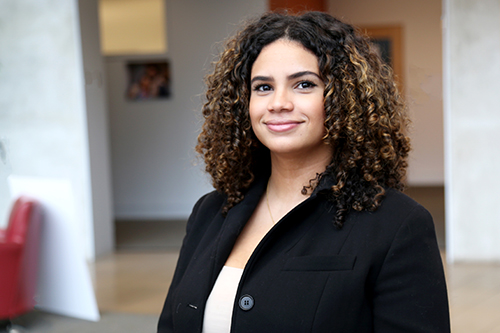
Heller Diversity, Equity and Inclusion Scholar
When Maria Aybar helped found the Latinx Community Center for Empowerment (LCCE), her goal was to serve the Latinx community in her hometown of Lowell, Mass. Through LCCE, Maria and a team of six help promote the socio-economic development and civic life of the Latinx community. LCCE partners with a variety of non-profits in the city, including Lowell Votes, a coalition of Lowell-based organizations that improve voting access and foster civic engagement in the Latinx community.
Lowell is a demographically diverse city, perhaps best known for its historic 19th-century textile mills. Fewer people are aware of the rich history of Puerto Rican, Dominican and Colombian immigrants who now call the city their home. Thus, in addition to providing social services to newly-arrived Latinx immigrants, Aybar and the LCCE recently received a grant to build an archive of Lowell’s Latinx history and culture.
“We’re interested in changing the narrative around the Latinx community here in the city of Lowell,” she says. “We’re going to collect oral histories and photographs, making sure we’re being representative of different Latinx voices in the community, and give people the opportunity to tell their stories themselves.”
Aybar spent her early years in the Dominican Republic before moving to Lowell, where she navigated high school and college as an undocumented student. Having missed the eligibility cutoff for DACA by a hair’s breadth, she knew first-hand how critical it is to design social policies that benefit the maximum number of people. Although Aybar is no longer undocumented, that experience inspired her to devote her professional career to improving the lives of other Latinx immigrants – especially undocumented women.
“Being an undocumented student made me question, who is making these policies? Who gets to decide who gets to have these privileges, over others? That’s why I decided to pursue an MPP. Voices like mine are necessary when it comes to shaping these kinds of policies.”
Aybar also works part-time as a Success Scholars coach at Middlesex Community College (MCC), which she previously attended. At MCC she provides mentorship and support to BIPOC and LGBTQ+ students. Most of her work focuses on shedding light to undocumented student resources, designing support systems targeting their needs, and providing guidance to staff and faculty working with them.
“We have to bring visibility to undocumented students,” she says. “Programs like this can help influence policies at other community colleges and other institutions in Massachusetts and beyond.”
When she decided to pursue a master’s degree, she considered MPP programs as well as law school. Ultimately, it was the Heller MPP program’s concentration in Women’s Gender and Sexuality studies that proved the deciding factor in her graduate school search.
“As a society, we don’t talk much about undocumented women. Most of the conversation is about the male experience, but over the years we have witnessed the feminization of migration, both in the U.S. and elsewhere. I ask myself, how do we build social policy that supports this growing population? Often, these women are abused by employers and even their partners and family members due to their status and lack of legal protections. Heller, with the WGS concentration, gives me the chance to do research that centers undocumented women. That, and the focus on social justice, drew me to Heller over other schools.”
In addition to the welcoming nature of the Heller community, Aybar has been particularly struck by the approachability of the MPP faculty. “I can ask to meet with any Heller professor, and the first thing they’re going to ask me is, ‘How are you doing? How’s it going?’ That speaks volumes.”
